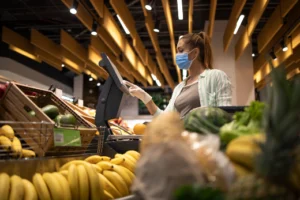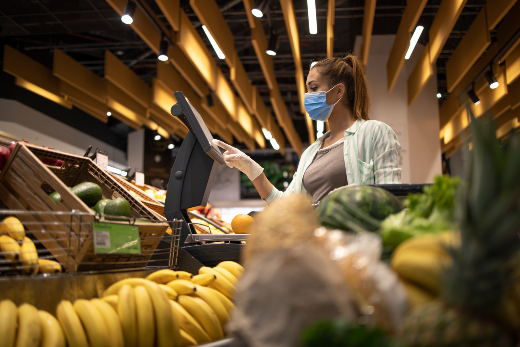Key Takeaways
- Schwarz Group’s STACKIT cloud repositions the discounter as a sovereign digital infrastructure provider.
- Ocado operates Europe’s most advanced AI-powered fulfillment centers.
- Tesco and Carrefour use biometric, QR, and voice tech to enhance real-time retail.
- REWE and Alnatura align digital tools with hyperlocal sourcing and environmental goals.
- The grocery store of 2025 is a data platform, not just a checkout counter.

In Hamburg, Grocery Shopping Now Runs on a Proprietary Cloud At a Lidl in Hamburg’s Altona district, digital shelf tags flicker based on demand, weather, and inventory data piped in through STACKIT—a sovereign cloud infrastructure built in-house by Schwarz Group. “STACKIT lets us control every retail process and protect customer data locally,” said Michael Huber, store technology manager. “It’s our infrastructure, not someone else’s.”
Schwarz Group (Lidl & Kaufland)
Germany STACKIT powers dynamic pricing, real-time replenishment, and in-store AI signage. With 4M+ m² of solar panels and a 200MW data center in Lübbenau, Schwarz is not just innovating retail—it’s exporting cloud.
Schwarz Group is no longer just the largest retailer in Europe by revenue. It is now a digital platform provider, powering its operations and offering services to other firms through its STACKIT Cloud.
“The goal is full control over data, logistics, and customer interfaces,” said an executive on a Q1 earnings call earlier this year. In practice, this means self-checkouts powered by real-time ERP, predictive analytics on customer behavior, and dynamic AI media displays that adjust by hour and shopper profile.
Its environmental infrastructure is equally expansive: 4 million square meters of solar panels, EV logistics across Germany, and near-total in-store waste recycling.
Ocado Group
UK / Europe AI handles 500+ functions at its CFCs in Spain and France. CEO James Matthews told BBC: “We’ve replaced warehouse jobs not with layoffs, but with systems that need supervising, not operating.”
Ocado’s transformation from online grocer to B2B automation platform is complete. Its customer fulfillment centers (CFCs) in Spain and France now operate with minimal human input. Chains like Groupe Casino, Bon Preu, and Rewe digital leverage Ocado’s platform for their backend logistics.
Earlier this year, Ocado disclosed it had replaced over 500 office and warehouse roles with AI-driven systems—triggering union debates in the UK but winning efficiency accolades from analysts.
“They are AWS for food logistics,” said Judith Mézières, a Paris-based retail tech consultant. “No stores, yet every store depends on them.”
Robotic arms, bots and AI: James Matthews, CEO @OcadoTechnology, showed @BBCNews how we are at the forefront of online grocery at our newest high-tech CFC in Luton, UK. #OcadoGroup #OnlineGrocery #AI https://t.co/CibpVwHend
— Ocado Group (@OcadoGroup) April 23, 2024
Aldi Nord & Süd
Germany Aldi uses AI ESLs, heatmapping, and app automation. According to its 2024 ESG Report, it cut perishable waste 6.8% year-over-year using blockchain expiry tracking.
Aldi isn’t making headlines, but it is digitizing at scale. Across thousands of locations, electronic shelf labels adjust pricing using AI models that account for expiry, local demand, and dayparting.
Heatmapping tracks customer flow. Backend AI reorders stock with near-zero human input. In its 2024 report, Aldi Süd cited a 6.8% reduction in perishable waste, attributed largely to blockchain tracking of sell-by dates.
The chain’s mobile app—barebones but blisteringly fast—has quietly surpassed 10 million downloads in Europe.
REWE Group
Germany AR overlays recipes and sourcing data via app. Shopper Franziska L., interviewed in Cologne, said, “I used to Google recipe ideas. Now they appear as I shop.”
REWE’s Cologne flagship showcases one of Europe’s most immersive retail tech stacks. With its AR shopping app, customers scan items to view origin stories, recipe ideas, and nutritional overlays. Combined with AI loyalty tools, the system adjusts promotions based on local events—barbecue discounts triggered by weekend forecasts, for instance.
“We’re not just digitizing stores,” said CEO Lionel Souque in a recent interview. “We’re contextualizing them.”
Its sustainability push is real: electric cargo bikes for urban deliveries, refill stations in city centers, and plastic-free pilots across its “REWE Green” store line.
Tesco
UK QR-coded packaging delivers traceability and recycling info. 2024 annual figures show scan-pay-go usage hit 70% in major cities.
Tesco’s innovation is physical and digital. Over half its private-label range now uses QR-coded packaging, offering recycling instructions, allergen data, and embedded offers.
The company has expanded scan-pay-go checkout zones in London and Manchester, where over 70% of customers now bypass tills entirely. Voice-activated store guides—powered by its “Tesco Smart Assistant”—are being rolled out in high-traffic stores.
Carrefour
France Smart carts, biometrics, and AI signage shape urban stores. A Paris shopper noted in-store that “my loyalty card is now my face”—a reference to seamless biometric entry.
At Carrefour’s urban flagships in Paris and Lyon, facial recognition grants loyalty members express entry. Smart carts equipped with navigation assist customers through pre-built shopping lists.
In-store product placement is no longer static. AI-driven digital signage shifts based on crowd flow, time of day, and stock levels.
Its “Green Trail” campaign—highlighting eco-alternatives in-store—boosted category sales by 18% in its first quarter, according to internal figures.
E.Leclerc
France Franchise-led innovation fuels Click & Collect Refill. A 2024 internal brief notes 18% reduction in single-use plastic use year-on-year.
Leclerc’s franchise model has become a testing ground for hyperlocal innovation. Each store owner has access to a Smart Coop dashboard powered by internal AI, enabling independent experimentation in layout, promotions, and stock.
Its “Click & Collect Refill” program is now active in 120+ locations, allowing customers to refill pantry staples without packaging.
A pilot blockchain traceability tool lets consumers trace pork and dairy back to specific farms, part of the “Je Sais Ce Que Je Mange” campaign.
Edeka
Germany Seasonal AI tailors inventory store-by-store. Store manager Petra V. said in Leipzig: “Our micro-store sells what this block actually eats—not guesses.”
Edeka’s strength lies in its dual identity—community grocer and analytics hub. Its seasonal inventory AI tracks local patterns across regions and adjusts store layouts accordingly.
Micro-stores in cities like Leipzig and Düsseldorf offer curated selections in under 200 square meters, targeting commuters and cyclists.
Promotions increasingly tie into cultural events—think discounted ingredients for local food festivals or loyalty points redeemable at regional fairs.
SPAR
Netherlands HQ, Europe-Wide SPAR GO shops under 60m² use facial checkout and rooftop gardens. Loyalty app lets users vote on new SKUs.
SPAR’s decentralized footprint allows it to pilot innovation quickly. Nano-format SPAR GO stores—under 60m²—use facial checkout and voice-activated shopping lists. In Vienna, rooftop herb gardens support hyperlocal supply.
Its in-app currency, SPAR Coins, can now be used to vote on new product introductions—essentially turning loyalty into democratic engagement.
Alnatura
Germany Shoppers scan QR to access eco-ratings. Product sourcing now partly customer-voted via its “Kundekreis” platform.
Alnatura has made sustainability transparent. Shoppers scan QR codes for data on emissions, water use, and sourcing. Real-time eco-rating tags appear on shelves—an industry first.
Its customer circle program crowdsources product decisions—last year, more than 25,000 customers voted on which plant-based yogurt to stock.
Its stores run on climate-neutral logistics, and over 70% now feature refill systems using glass jars.
| Retailer | Tech Focus | Sustainability | Location |
| Schwarz Group | Cloud platform (STACKIT) | Solar, EV logistics | Germany |
| Ocado | AI fulfillment centers | Centralized | UK, Spain, France |
| REWE | AR shopping, loyalty AI | Plastic-free, refillables | Germany |
| Carrefour | Biometrics, smart carts | Green Trail campaign | France |
| Alnatura | Eco QR traceability | Neutral logistics, customer co-creation | Germany |
Where Retail Ends and Infrastructure Begins
The European grocery sector is no longer a story of store counts or checkout speed. In 2025, it’s about sovereignty, data gravity, climate alignment, and consumer intimacy.
From Schwarz’s cloud platform to Alnatura’s eco-transparency, these 10 supermarkets represent more than innovation. They embody a tectonic shift in retail’s purpose and power: from selling goods to owning the digital rails of food life.



